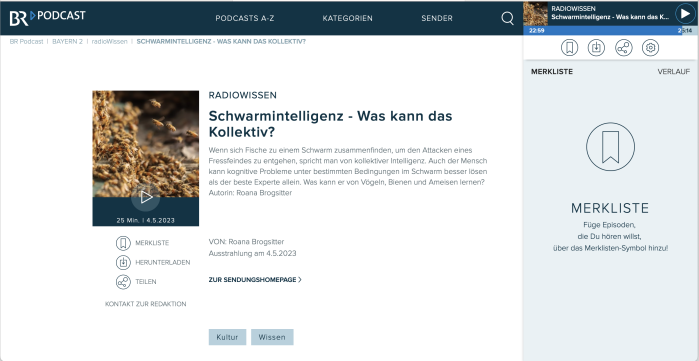News
Cognitive Vitality
CI chair is part of the Cognitive Vitality Initiative. As one of the leaders of Data Science and Computational Modelling (DECODE) platform, we contribute to the important missionof "A healthy mind in every body".
More information:
https://cognitive-vitality.de/en/
New ZIM Project: Aim-FarmRob - Aimess Intelligenter Farm Roboter
A new ZIM Project Aim-FarmRob "Aimess Intelligenter Farm Roboter" has been approved.
Description (in German):
Das Projekt Aim-FarmRob unter Projektleitung von Dr. Christoph Steup dient der Entwicklung und Fertigung eines Prototyps für eine variable autonome KI-gestützte Roboterplattform für landwirtschaftliche Zwecke. Der Roboter dient dazu, arbeits- und damit kostenintensive Prozesse der Landwirtschaft zuverlässig zu automatisieren. In der ersten Stufe der Entwicklung wird der Roboter in der Lage sein, autonom auf vorher festgelegten Feldern Bodenproben zu nehmen, um die Planung der Bewirtschaftung und das Ausbringen von Düngemittel zu optimieren. Zu diesem Zweck kooperieren die Aimess GmbH Burg mit dem Lehrstuhl Computational Intelligence der Otto-von-Guericke Universität. Die Aimess GmbH konstruiert und fertigt den Roboter und entwickelt die Low-Level Software, während der Lehrstuhl CI die High-Level Software und die KI-Komponenten entwickelt. Die KI-Komponenten in dieser Entwicklungsphase dienen der Erkennung von Pflanzreihen und die Bewertung des Wuchszustandes sowie der Verbesserung der Lokalisierung des Roboters, um maximal zuverlässige Positionsinformationen für die Bodenproben und zukünftige Module zur Verfügung zu stellen.
RoboCup 2023 in Bordeaux
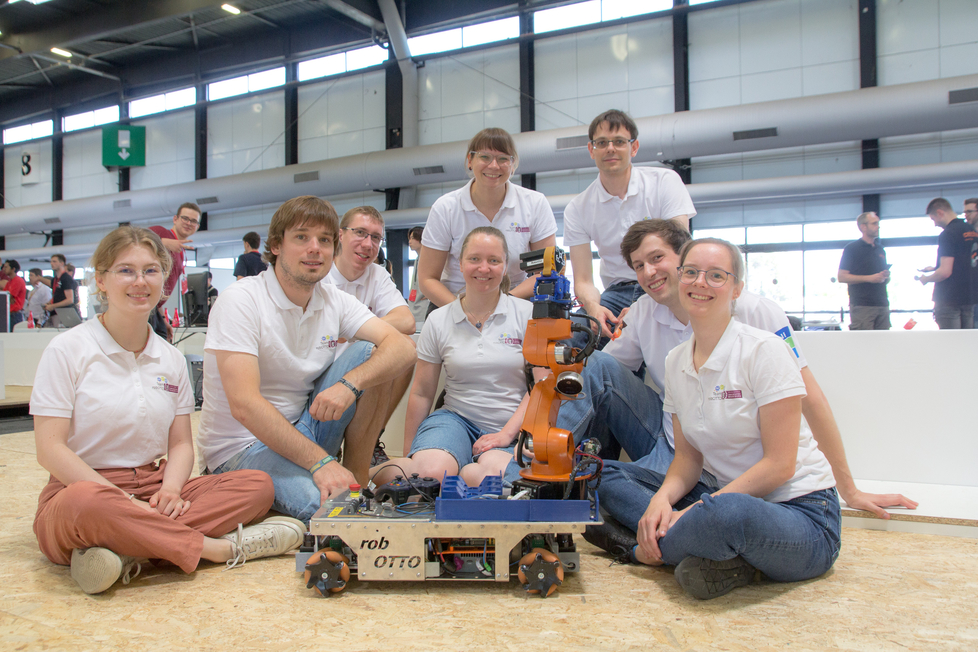
An exciting week full of thrilling competitions, technical innovations and friendly atmosphere took place in Bordeaux, France, from June 4 to 10, 2023. At RoboCup 2023, teams from all over the world competed in various leagues with their robots, some of which were autonomous. In the RoboCup@Work league, which focuses on the use of robots in industrial environments, team robOTTO from Otto von Guericke University Magdeburg came out on top and secured third place (2nd place - team SWOT from Schweinfurt, 1st place - team b-it-bots from Bonn-Rhein-Sieg University of Applied Sciences) - an impressive result achieved despite some challenges. Additionally, the team won one of the two challenge awards.
The RoboCup@Work league focuses on the use of autonomous robots in industrial scenarios. The robots navigate autonomously in partially known environments and perform manipulations on industrial objects. This is intended not only to showcase the current state of robotics for potential industrial applications, but also to give students and researchers the opportunity to apply their theoretical knowledge in practice. The competition consisted of six heats, three of which included basic tasks that served as the basis for the three advanced heats.
The RoboCup@Work league focuses on the use of autonomous robots in industrial scenarios. The robots navigate autonomously in partially known environments and perform manipulations on industrial objects. This is intended not only to showcase the current state of robotics for potential industrial applications, but also to give students and researchers the opportunity to apply their theoretical knowledge in practice. The competition consisted of six heats, three of which included basic tasks that served as the basis for the three advanced heats.
In addition to the competition, Team robOTTO was actively involved in the organization, modification of the rulebook, and public relations - a unique feature of most RoboCup leagues, where the teams organize the league themselves.
The challenges that team robOTTO faced added to the excitement of the competition. Navigating the robot proved difficult at first, as the environment in Bordeaux was different than expected. The uneven and moving floor of the arena posed a challenge for all teams and caused problems in locating the robots. In addition, team robOTTO reached its limits with its older robot arm, especially in terms of speed. The integration of a new arm is planned for next year to address these challenges.
A total of seven teams from Germany, the Netherlands and Singapore took part in the competition. The friendly atmosphere between the teams, who exchange ideas throughout the year, was palpable during the competition days. RoboCup 2023 is not only a competition, but also a place for exchange and networking. In addition to the actual competitions, various evening events gave teams the opportunity to get to know each other better and share experiences. The highlight of the event was an atmospheric farewell party.
As the teams return home and review their experiences, they are already looking ahead to next year. RoboCup 2024 will be held in Eindhoven, the Netherlands, and promises to once again be a stage for groundbreaking technology and competitive spirit. The @Work league will be represented by the host team from Eindhoven, Team RoboHub. Not only will they experience the challenges and excitement of competition, but they will also be responsible for creating a welcoming and inspiring atmosphere for teams from around the world.
Between now and next year in Eindhoven, teams will be working hard to develop their robots, explore new technologies and prepare for the challenges ahead. RoboCup 2024 will undoubtedly provide another opportunity to push the boundaries of robotics and share the excitement of autonomous action in industrial environments.
Bronze Humie Award @GECCO 2023
We received the 2023 Humies Bronze Award!!!
HUMAN COMPETITIVE RESULTS AWARDS (20th Annual "HUMIES")
Presented at the Genetic and Evolutionary Computation Conference (GECCO), July 15-19, 2023, Lisbon, Portugal
For our work: Julia Reuter; Hani Elmestikawy; Sanaz Mostaghim; Berend van Wachem; Fabien Evrard; Manoj Cendrollu, Towards Improving Simulations of Flows around Spherical Particles Using Genetic Programming
German: Im Juli 2023 nahm der Lehrstuhl für Computational Intelligence mit dem Eintrag von Julia Reuter mit dem Titel „Identifying Symbolic Models für Particle-Laden Flows“ am 20. Jährlichen ACM SIEGEVO HUMIES Wettbewerb teil und bekam den mit 1000 USD dotierten Bronze Award verliehen. Wir freuen uns sehr über diese Auszeichnung!
Der ACM HUMIES Award wird verliehen an Publikationen, die durch genetische und evolutionäre Programmierung Ergebnisse erzielt haben, die „human-competitive“ sind, also die genauso gute oder bessere Resultate bei der Lösung eines Problems erreichen wie ein Mensch. Die von uns eingereichten Publikationen entstanden in einem gemeinsamen DFG-Projekt den Lehrstühlen von Prof. Mostaghim (FIN) und Prof. van Wachem (FVST). Der Wettbewerb wurde während der GECCO Konferenz 2023 in Lissabon ausgetragen. Aus insgesamt 19 Bewerbungen wurden acht Einträge ausgewählt. Diese konnten im Finale in einer zehnminütigen Präsentation die Jury, bestehend aus anerkannten Expert:innen des Forschungsgebiets, von der Qualität ihrer Arbeit überzeugen.
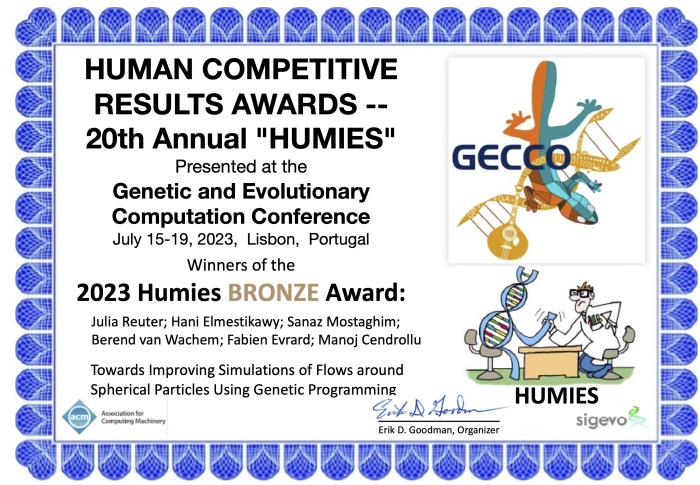
Firmen Staffellauf 2023
SwarmLab was part of the Firmen Staffellauf 2023. Well-done SwarmLab!!
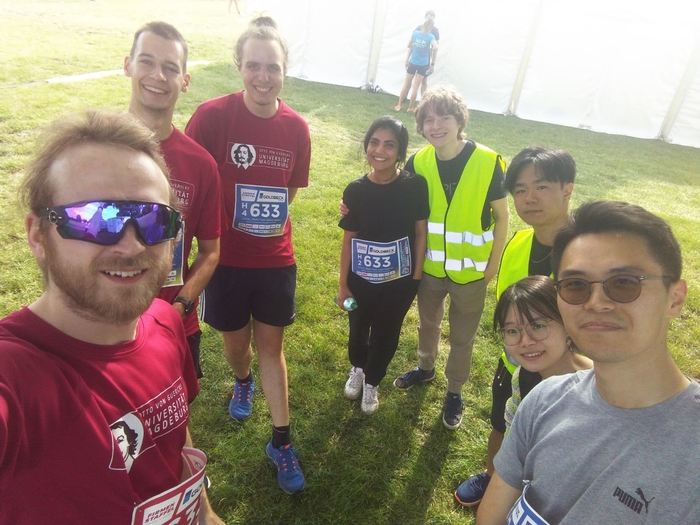
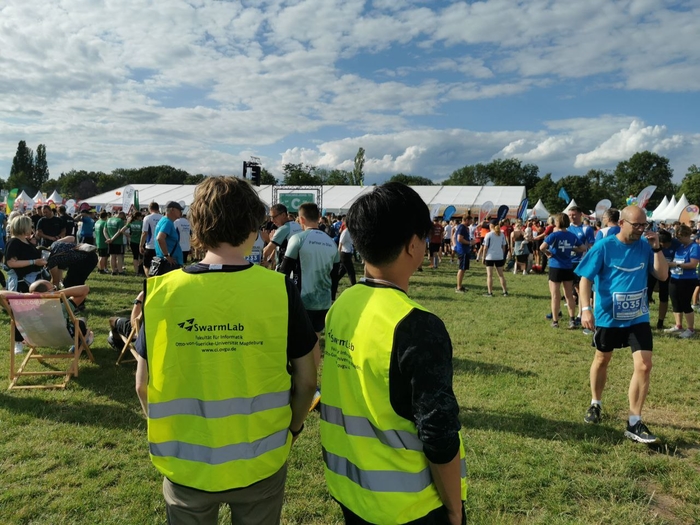
Best Poster Award at IEEE Conference on AI
We received the best poster award for the paper:
- Thomas Seidelmann and Sanaz Mostaghim
- Surrogate Functions and Digital Twin Simulation for Modern Facility Layout Planning
- Accepted at IEEE Conference on AI 2023
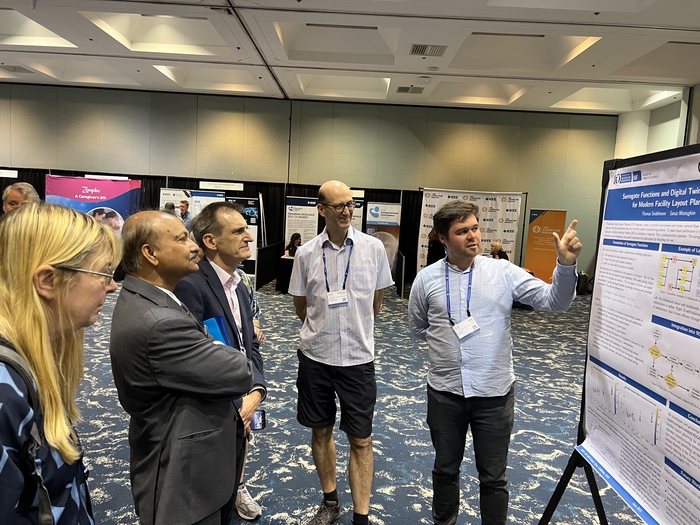
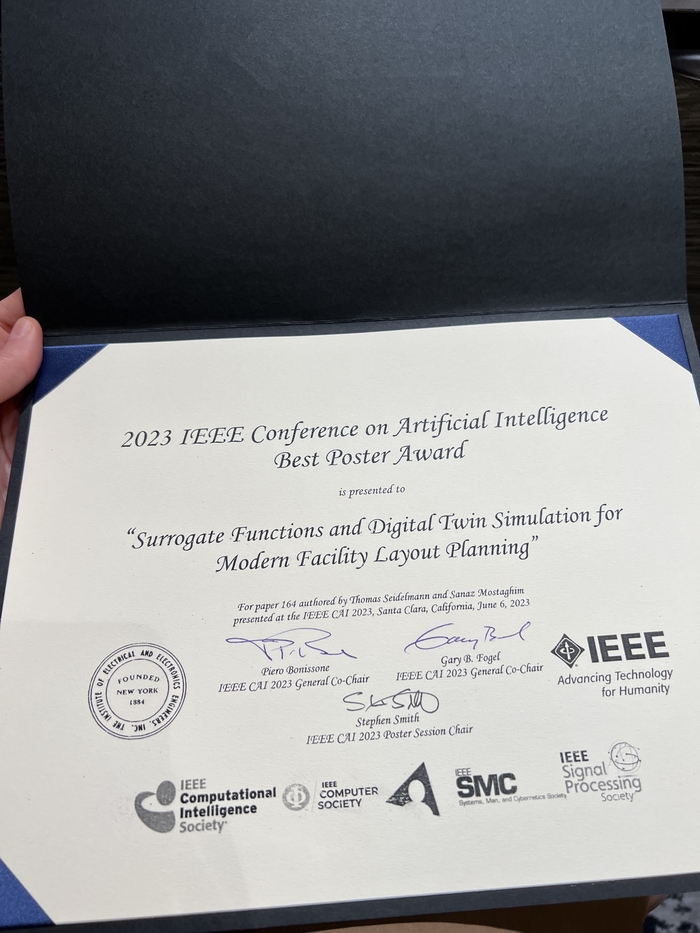
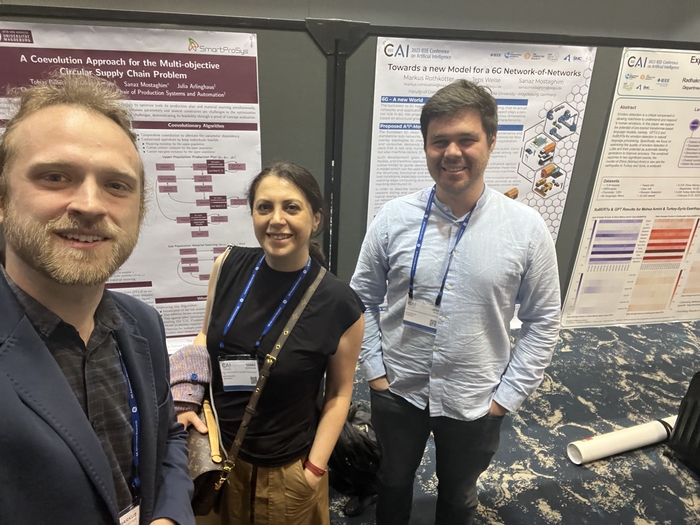
Kickoff Meeting of DFG project WSAM
The DFG project WSAM (Wide Synthetic Aperture Sampling
for Motion Classification) officially started in a kickoff meeting at DLR Oberpfaffenhofen in Munich. Already looking forward to a fruitful project together with our cooperating partners from Linz University and DLR: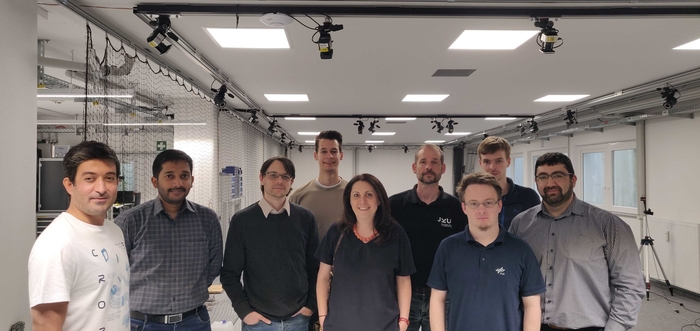
Interview Saxon Academy of Sciences
Take a closer look at Sanaz's Portrait at SAW:
Jugend Forscht 2023
It was a great pleasure to be part of the Bundesjury for Jugend Forscht (https://www.jugend-forscht.de/) 2023, which took place from May 18 to 21 in Bremen.
Spending time with very intelligent young students and discussing their ideas was really great! The motto "Mach Ideen Groß" is the foundation for anything we do in science.
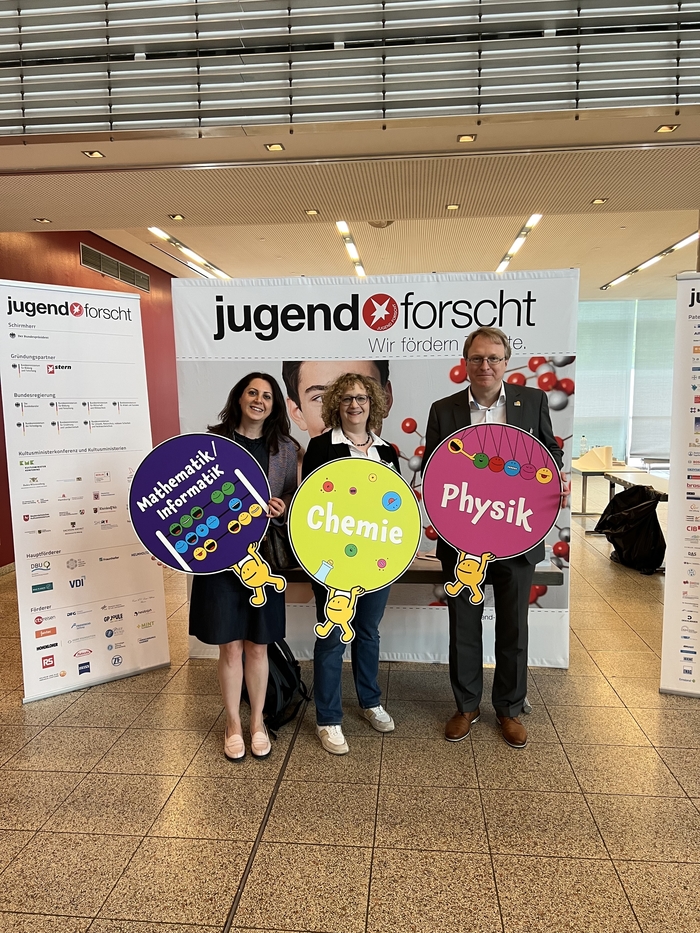
BR Podcast on Swarm Intelligence
Happy to be part of a podcast on Swarm Intelligence:
https://www.br.de/mediathek/podcast/radiowissen/schwarmintelligenz-was-kann-das-kollektiv/1979313
Interview about AI and Diversity
How much is AI influenced by the programmers? Given the fact that we have about 10 to 25% women in computer science, is this influencing AI? The answer to this question, was part of an interview, which Sanaz gave to SRF:
Women in Computational Intelligence
Always happy to support women in Computational Intelligence and computer science. This is a picture of the female members of the chair (Charitha and Kanwal are not on the picture).
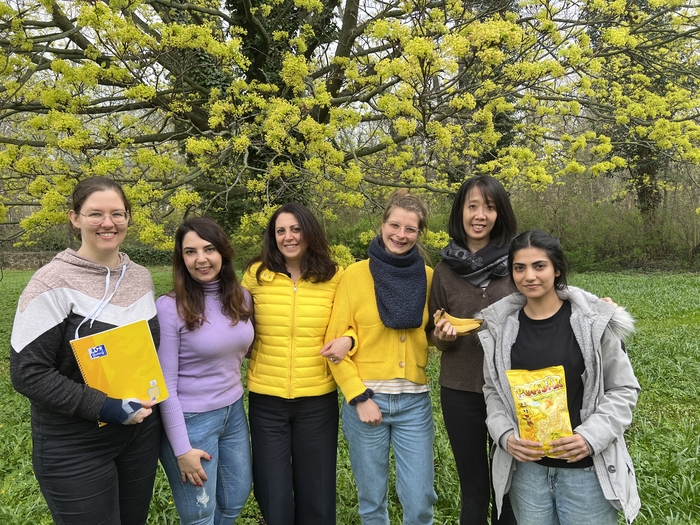
Talk at the law department at the University of Hanover on decision-making
Sanaz gave a talk at the faculty of law of the university of Hanover, about one of our major research topics on decision-making algorithms and the role of the human decision-maker.
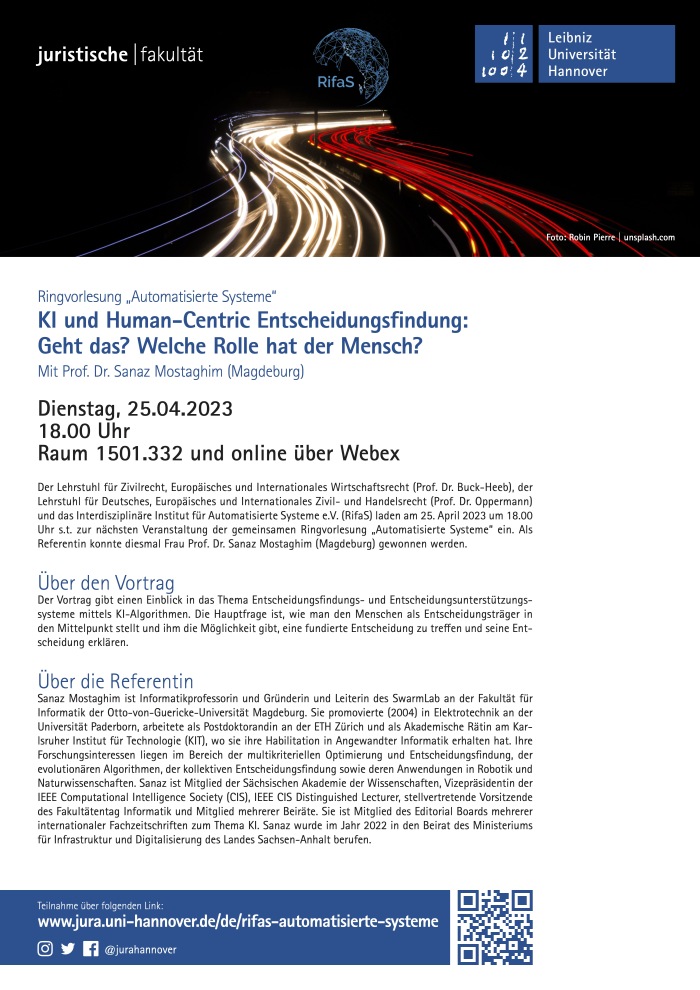
Research Retreat 2023
Our research retreat took place from 17 to 18 April in Thale.
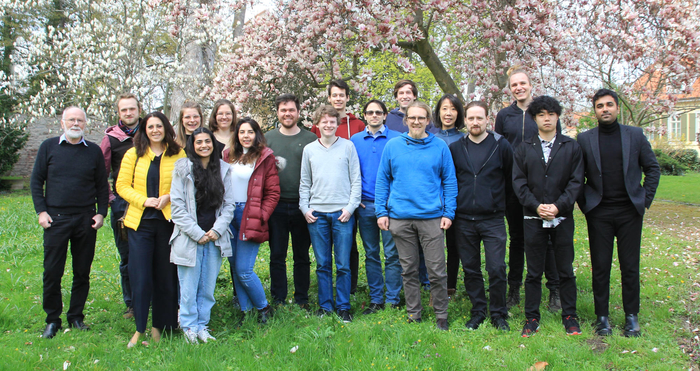
Best Paper Award at EvoStar 2023
Our paper
- Julia Reuter, Hani Elmestikawy, Sanaz Mostaghim, Fabien Evrard and Berend van Wachem
- Graph Networks as Inductive Bias for Genetic Programming: Symbolic Models for Particle-Laden Flows
- In: Pappa, G., Giacobini, M., Vasicek, Z. (eds) Genetic Programming. EuroGP 2023. Lecture Notes in Computer Science, vol 13986. Springer, Cham. https://doi.org/10.1007/978-3-031-29573-7_3
received the best paper award at the EuroGP conference, which took place in Brno, Czech Republic
, 12-14 April 2023.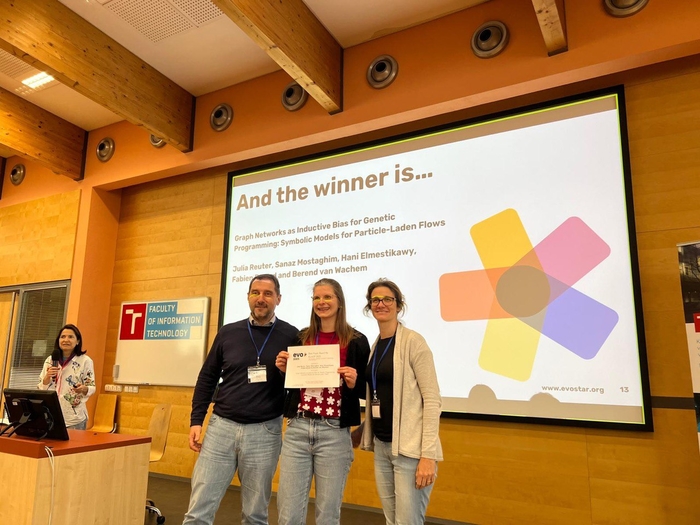
Tobias also received the best student poster award at the same conference:
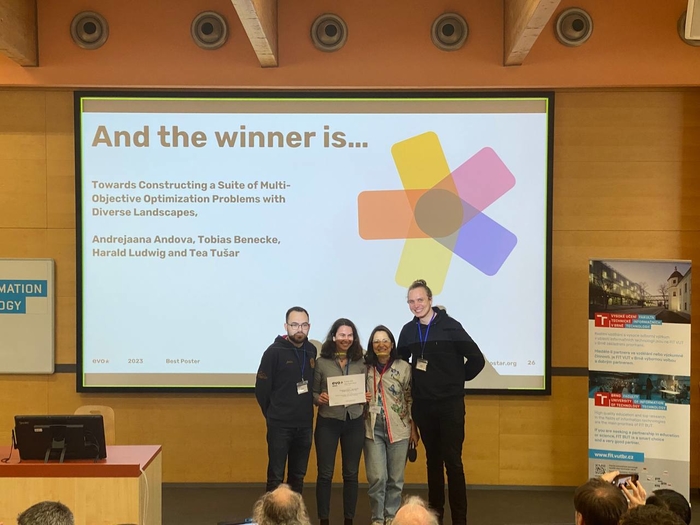
Simon's PhD Defense
Simon Anderer successfully defended his PhD with the title:
Role Mining for Industrial-strength ERP Systems Using Evolutionary Algorithms
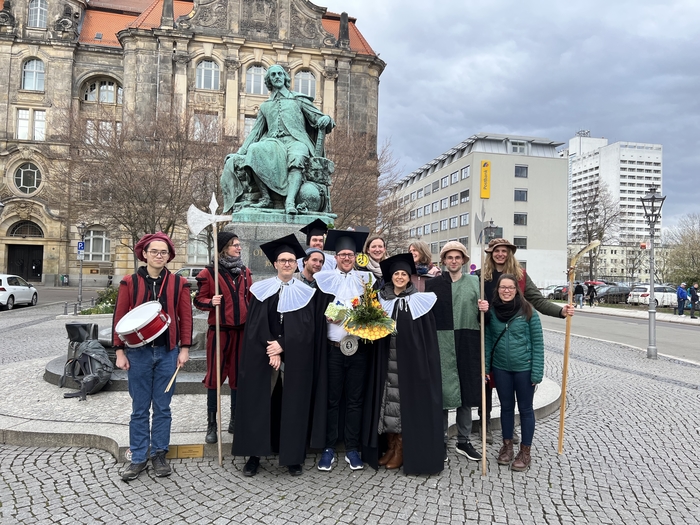
New DFG Project
A new DFG project which is jointly financed by the Austrian Science Fund (FWF) has been approved. We will collaborate with the Johannes Kepler University in Linz and the German Aerospace Center (DLR) in Oberpfaffenhofen. The goal of the project is the use of autonomous drone swarms for rescue applications.
Here, drones can imitate the swarming behavior of birds to always have an optimal view for rescue purposes.Considering the current high level of attention that is being paid to drones, it is easy to overlook the enormous potential that they bring with them in civilian areas. Drone groups are establishing themselves worldwide in blue light organizations such as the police, fire brigade and mountain rescue to use this technology to save human lives. Search and rescue operations benefit, among other things, from the flexible, fast and - compared to helicopters - inexpensive and safe use of drones. They are also used in the inspection of disaster areas, for the early detection of forest fires, for border security, or wildlife observation. The problem with all these applications is always the occlusion caused by vegetation, such as forest, which usually makes it impossible to find, detect, and track people, animals or vehicles in single aerial photographs. This project is based on the "Airborne Optical Sectioning" (AOS) imaging method developed at the Johannes Kepler University and will study further potentials of the swarms.
PhD Defense Jens Weise
On 6th February, Jens Weise successfully defended his PhD with the title "Evolutionary Many-Objective Optimisation for Pathfinding Problems":
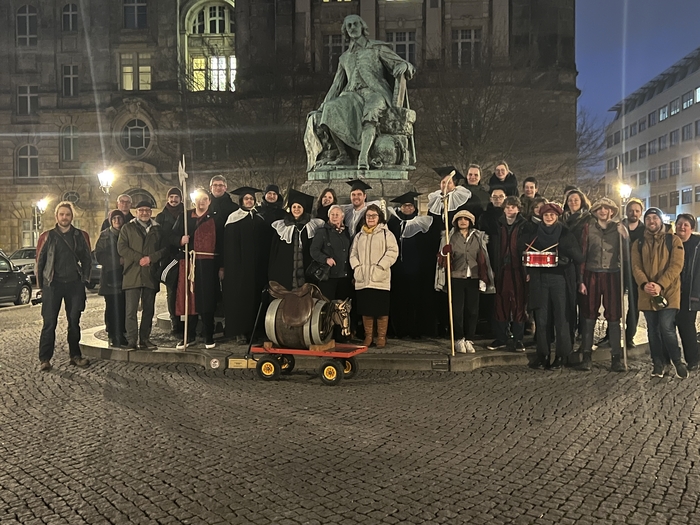
Keynote talk of Prof. Deb
On Monday 6th February, Prof. Kalyanmoy Deb from Michigan State University gave a University Guest lecture with the Title "Evolutionary Multi-Criterion Optimization: An Emerging Computational Problem-Solving Tool". Over 100 participants attended the talk.
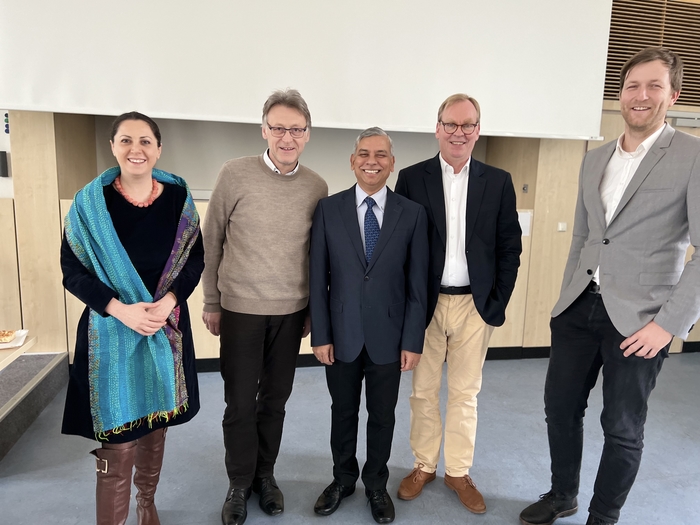
Picture Left to right: Prof. Sanaz Mostaghim, Prof. Jens Strackeljan (President of the University), Prof. Kalyanmoy Deb, Prof. Hans-Knud Arndt (Dean of the Faculty of Computer Science), Prof. Pascal Kerschke (TU Dresden).
Abstract: Most problems in science, engineering and commerce involve more than one conflicting criteria to be simultaneously optimized. Despite the vast literature on scalarizing multiple criteria into one, evolutionary optimization methods of treating them as truly multi-criterion problems in a Pareto sense produce a number of additional benefits to the users. Their ability to find and maintain multiple trade-off solutions with a flexible and customizable framework provides vital knowledge about the problem in addition to the optimal solutions themselves. In this lecture, we shall present a few popular and state-of-the-art algorithms, demonstrate their advantages on a number of real-world practical problems from engineering and society, and introduce some recent research topics. Additionally, the use of machine learning algorithms and human knowledge in enhancing their performance, and the use of multi-criterion algorithms in enhancing performance of machine learning methods will be discussed.
Bio-sketch: Kalyanmoy Deb is University Distinguished Professor and Koenig Endowed Chair Professor at Department of Electrical and Computer Engineering in Michigan State University, USA. Prof. Deb's research interests are in evolutionary optimization and their application in multi-criterion optimization, modeling, and machine learning. He is and has been a visiting professor at various universities across the world including University of Skövde in Sweden, Aalto University in Finland, Nanyang Technological University in Singapore, and IITs in India. He was awarded IEEE Evolutionary Computation Pioneer Award for his sustained work in multi-objective optimization, Infosys Prize, TWAS Prize in Engineering Sciences, CajAstur Mamdani Prize, Distinguished Alumni Award from IIT Kharagpur, Edgeworth-Pareto award, Bhatnagar Prize in Engineering Sciences, and Bessel Research award from Germany. He is fellow of ACM, IEEE, and ASME. He has published over 600 research papers with Google Scholar citation of almost 180,000 with h-index 129. More information about his research contribution can be found from https://www.coin-lab.org.
Prof. Kruse as a Jury of BBVA Award
Prof. Kruse was part of the Jury for the prestigious BBVA Award: https://www.frontiersofknowledgeawards-fbbva.es/noticias/15th-edition-information-communication-technologies-alberto-sangiovanni-vincentelli/
